Clinical Pharmacology & Experimental Therapeutics Center
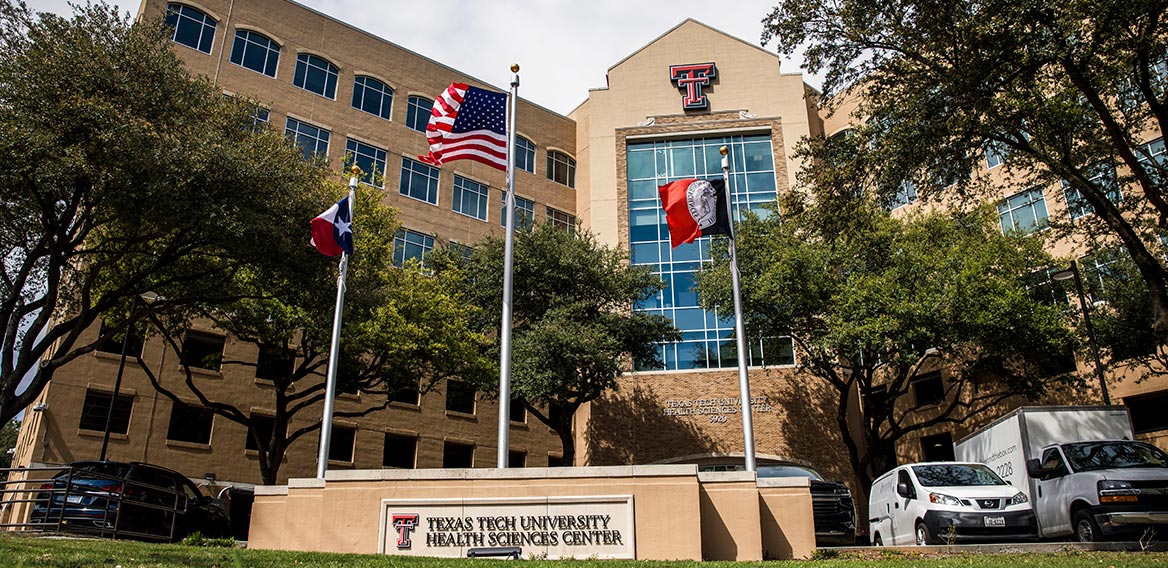
Clinical Pharmacology & Experimental Therapeutics Center
The center provides pharmaceutical expertise to conduct and support preclinical and clinical/translational trials, and postmarketing assessment of pharmaceutical drugs. The Clinical Pharmacology & Experimental Therapeutics Center consists of three core areas of focused research:
- North Texas Clinical Pharmacology Cancer Core (funded in part by the Cancer Prevention and Research Institute of Texas)
- Regulatory Sciences Core
- Experimental Therapeutics and Diagnostics Core: has preclinical resources for researchers and collaborators to develop and test new drugs and enable translational research in drug discovery/development. Our cell disease models in cancer and neurodegeneration diseases are designed for drug screening, new therapeutic target exploring, as well as drug tolerability and efficacy studies. With our advanced instrumentation, that includes three advanced mass spectrometry with established proteomics, metabolomics and epigenetics workflow, we are striving to discover new diagnostics biomarkers of cancer and neurodegeneration diseases with our clinic collaborators.

Ronald G. Hall II, Pharm.D., MSCS
Center Director and Associate Professor, Departments of Pharmacy Practice
Focus of Research: Dose Optimization and Outcomes Research

Li Li, Ph.D.
CPRIT Core Director and Assistant Professor, Departments of Pharmacy Practice and Pharmaceutical Sciences
Focus of Research: Drug Metabolism and Drug Discovery

William “Trey” Putnam, Ph.D., RAC
Investigator and Professor, Departments of Pharmacy Practice and Pharmaceutical Sciences
Focus of Research: Clinical Pharmacology and Metabolism
- Title: North Texas Clinical Pharmacology Cancer Core
- Investigators: Li PI, Hall Co-I, Alvarez Co-I, Putnam Co-I
- Funding Agency: Cancer Prevention & Research Institute of Texas
- Description: One sentence description: The North Texas Clinical Pharmacology <p>Content 3 Here</p>Cancer Core (NTCPCC) provides assay development, validation and quantitative sample analysis for both large and small molecules in complex biological fluids/tissues to assist with both basic science and clinical research studies using LC-MS/MS or other chromatography based techniques.
- Title: Method Development and Analysis of a Novel Formulation
- Investigators: Putnam PI, Hall Co-I
- Funding Agency: Cook Children’s Health Care System
- Description: One sentence description: Assay development and analysis of drug concentrations for a novel formulation of an existing pharmaceutical product.
- Title: Fingolimod and Ozanimod for the treatment and prevention of chemobrain
- Investigators: Putnam Site PI
- Funding Agency: NIH/NCI
- Description: One sentence description: The study is being conducted to provide paradigm-shifting insights that establish S1PR1 in CICI and expedite translational investigation of medicines that are already FDA approved (fingolimod/ozanimod) as adjunct to chemotherapy.
- Title: A Phase II Trial to Evaluate the Effect of Itraconazole on Pathologic Complete
Response Rates in Resectable Esophageal Cancer
- Investigators: Putnam Site PI
- Funding Agency: VA Office of Research and Development
- Description: One sentence description: The investigators are evaluating whether administering itraconazole around chemoradiation will lead to higher pathCR rates, which would likely be able to improve treatment outcomes in patients with esophageal and GEJ cancer.
- Islam MR, Patel J, Back PI, Shmeeda H, Kallem RR, Shudde C, Markiewski M, Putnam WC, Gabizon AA, La-Beck NM. Pegylated Liposomal Alendronate Biodistribution, Immune Modulation, and Tumor Growth Inhibition in a Murine Melanoma Model. Biomolecules. 2023; 13(9):1309. https://doi.org/10.3390/biom13091309
- Avila A, Málaga I, Sirsi D, Kayani S, Primeaux S, Kathote GA, Jakkamsetti V, Kallem RR, Putnam WC, Park JY, Shinnar S, Pascual JM. Combination of triheptanoin with the ketogenic diet in Glucose transporter type 1 deficiency (G1D). Sci Rep. 2023 Jun 2;13(1):8951. doi: 10.1038/s41598-023-36001-x. PMID: 37268656; PMCID: PMC10238483.
- Málaga I, Avila A, Primeaux S, Kallem RR, Roe CR, Putnam WC, Park JY, Shinnar S, Ahn C, Pascual JM. Maximum dose, safety, tolerability and ketonemia after triheptanoin in glucose transporter type 1 deficiency (G1D). Sci Rep. 2023 Mar 1;13(1):3465. doi: 10.1038/s41598-023-30578-z. PMID: 36859467; PMCID: PMC9977760.
- Dobariya A, El Ahmadieh TY, Good LB, Hernandez-Reynoso AG, Jakkamsetti V, Brown R, Dunbar M, Ding K, Luna J, Kallem RR, Putnam WC, Shelton JM, Evers BM, Azami A, Geramifard N, Cogan SF, Mickey B, Pascual JM. Recording of pig neuronal activity in the comparative context of the awake human brain. Sci Rep. 2022 Sep 15;12(1):15503. doi: 10.1038/s41598-022-19688-2. Erratum in: Sci Rep. 2022 Nov 29;12(1):20588. doi: 10.1038/s41598-022-25156-8. Erratum in: Sci Rep. 2024 Apr 29;14(1):9836. doi: 10.1038/s41598-024-60111-9. PMID: 36109613; PMCID: PMC9478131.
- Kallem RR, Primeaux S, Avila A, Pascual JM, Putnam WC. Development and validation of a LC-MS/MS method for quantitation of 3-hydroxypentanoic acid and 3-oxopentanoic acid in human plasma and its application to a clinical study of glucose transporter type I deficiency (G1D) syndrome. J Pharm Biomed Anal. 2021 Oct 25;205:114335. doi: 10.1016/j.jpba.2021.114335. Epub 2021 Aug 27. PMID: 34482182; PMCID: PMC8488017.
- Zhang W, Bhagwath AS, Ramzan Z, Williams TA, Subramaniyan I, Edpuganti V, Kallem RR, Dunbar KB, Ding P, Gong K, Geurkink SA, Beg MS, Kim J, Zhang Q, Habib AA, Choi SH, Lapsiwala R, Bhagwath G, Dowell JE, Melton SD, Jie C, Putnam WC, Pham TH, Wang DH. Itraconazole Exerts Its Antitumor Effect in Esophageal Cancer By Suppressing the HER2/AKT Signaling Pathway. Mol Cancer Ther. 2021 Oct;20(10):1904-1915. doi: 10.1158/1535-7163.MCT-20-0638. Epub 2021 Aug 10. PMID: 34376577; PMCID: PMC8492513.
- Md Ashraf-Uz-Zaman, Sadisna Shahi, Racheal Akwii, Md Sanaullah Sajib, Mohammad Jodeiri Farshbaf, Raja Reddy Kallem, William Putnam, Wei Wang, Ruiwen Zhang, Karina Alvina, Paul C. Trippier, Constantinos M. Mikelis, Nadezhda A. German. Design, synthesis and structure-activity relationship study of novel urea compounds as FGFR1 inhibitors to treat metastatic triple-negative breast cancer, European Journal of Medicinal Chemistry, Volume 209, 2021, 112866, ISSN 0223-5234, https://doi.org/10.1016/j.ejmech.2020.112866.
- Putnam WC, Kallem RR, Edpuganti V, Subramaniyan I, Hall RG 2nd. Development and validation of a quantitative LC-MS/MS method for the simultaneous determination of ceftolozane and tazobactam in human plasma and urine. J Chromatogr B Analyt Technol Biomed Life Sci. 2020 Nov 30;1159:122354. doi: 10.1016/j.jchromb.2020.122354. Epub 2020 Sep 2. PMID: 32905989.
- Putnam WC, Kallem RR, Subramaniyan I, Beg MS, Edpuganti V. Bioanalytical method development and validation of a liquid chromatography-tandem mass spectrometry method for determination of β-lapachone in human plasma. J Pharm Biomed Anal. 2020 Sep 5;188:113466. doi: 10.1016/j.jpba.2020.113466. Epub 2020 Jul 8. PMID: 32668395.
- Soukup P, Faust AC, Edpuganti V, Putnam WC, McKinnell JA. Steady-State Ceftazidime-Avibactam Serum Concentrations and Dosing Recommendations in a Critically Ill Patient Being Treated for Pseudomonas aeruginosa Pneumonia and Undergoing Continuous Venovenous Hemodiafiltration. Pharmacotherapy. 2019 Dec;39(12):1216-1222. doi: 10.1002/phar.2338. Epub 2019 Oct 31. PMID: 31596506.
- Hall RG 2nd, Smith WJ, Putnam WC, Pass SE. An evaluation of tedizolid for the treatment of MRSA infections. Expert Opin Pharmacother. 2018 Sep;19(13):1489-1494. doi: 10.1080/14656566.2018.1519021. Epub 2018 Sep 10. PMID: 30200779.
The Center's analytical laboratory specializes in developing and validating methods for the analysis of both small- and large-molecule pharmaceutical agents, their metabolites, and biomarkers in complex biologic matrices using state-of-the-art bioanalytical techniques.
SCIEX 7500 is a QTRAP Triple Quad system featured with MRM3 QTRAP scan and an enhanced product ion (EPI) scan. Those are effective scan solutions that removes high background and interferences and can achieve lower detection limits compared to most existing triple quad systems. Especially with MRM3 scans, it offers better specificity and quantitative performance for drug metabolites that share similar structure or similar mass of fragment ions.
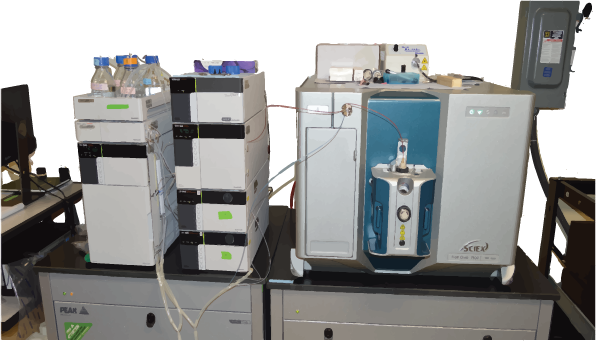
SCIEX ZenoTOF 7600 is a Q-TOF instrument equipped with a hybrid collision cell. The collision cell includes two collision modes -collision induced dissociation (CID) and electron activated dissociation (EAD). EAD (radical) and CID (thermal) collision could produce invaluable complimentary fragmentation maps that significantly increase the identification rate for biomolecule structures.
ZenoTOF 7600 is also a great tool to explore intact proteins with its build-in peak deconvolution software. With the ability to look at the intact proteins, we are easily on the path to explore protein posttranslational modifications and protein-protein interactions.
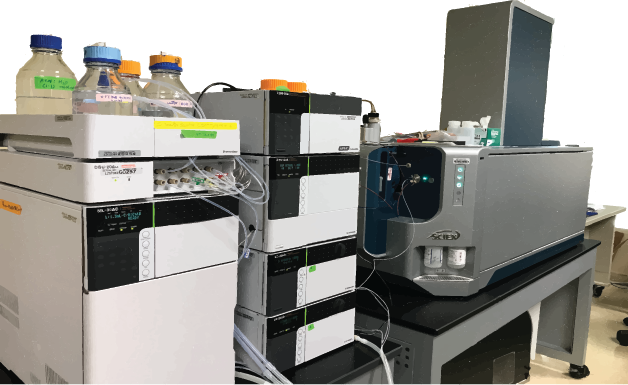
SCIEX 6500_SelexION differential mobility separation -
SCIEX 6500 QTRAP is a traditional Triple Quad system. QTRAP means the third quadrupole can be configured as a Linear Ion Trap (LIT) to provide simultaneous quantitation and identification without losing the sensitivity.
Our SCIEX 6500 is coupled with a differential ion mobility mass spectrometry SelexION, which provides the unique capability to separate analytes with identical molecular weights and retention times.
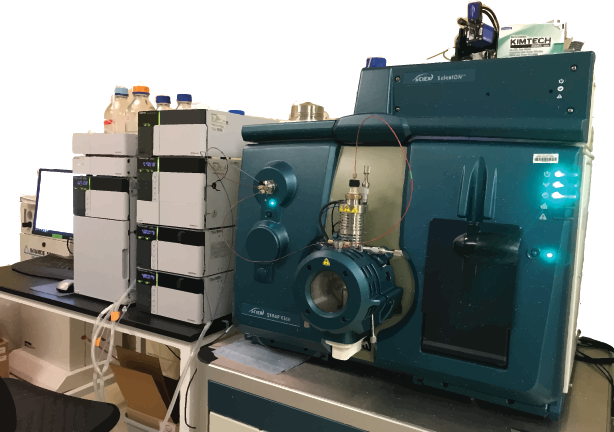
Leica Laser LDM6 Microdissection Microscopes is a contact- and contamination-free method for isolating specific single cells or an area of tissue. This tool allows us to study the biochemical heterogeneity within a tumor or among cells. It captures the spatial profile of quantitative analysis. It also enables single cell metabolomics or proteomics study for cancer as well as other diseases.
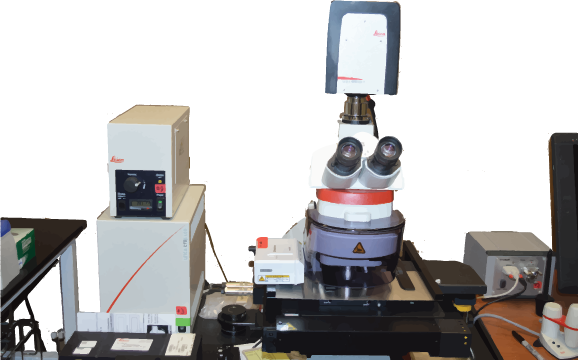
Overall, the Clinical Pharmacology & Experimental Therapeutics Center specializes in conducting pharmacology studies on experimental therapeutics.
Specific capabilities of the Center include:
- Bioanalytical method development
- Bioanalytical method validation
- Blood/Plasma/Serum sample analysis
- Tissue sample analysis / tissue distribution analysis
- Analyte/formulation stability studies
- Automated sample preparation
- Small molecule bioanalytical sample analysis
- Biomolecule bioanalytical sample analysis
- Metals analysis
- Pharmacokinetic determinations
- Targeted metabolite studies
- Chemical characterization of small molecules, biotherapeutics, formulated products and botanical extracts
- Regulatory development input
- Cell disease model for drug screening
Additional services provided by Center faculty:
- Program and protocol development and support
- Analyses and interpretation of PK and PK/PD data
- Population PK analysis for optimal dosing
- Laboratory space: ~2,500 square feet
- General equipment: analytical balances, pipettes, pH meters, centrifuges, two Labconco CentriVap® systems, two Nitrogen-evaporation systems, two refrigerators (5 ± 3 °C), two freezers (-20 ± 10 °C) and four ultra-freezers (-80 ± 10 °C). The ultra-freezers are continuously monitored and clinical samples are inventoried using FreezerPro® software package. Specialized automated sample preparation equipment includes an Eppendorf epMotion M5073 and a Tomtec Quadra 4® automated liquid handling systems.
- Tissue preparation equipment: Pro Scientific DPS-20 homogenization system (ultrasonic and mechanical homogenization); Leica RM2255 microtome, Leica CM3050S Cryostat, and a Leica LMP6 laser microdissection system.
- Mass spectrometric instrumentation includes: Sciex QTRAP® 6500+, Sciex QTRAP® 7500, Sciex TripleTOF™ 7600, and an Agilent 7700 ICP-MS. The Sciex QTRAP®and TripleTOF™instruments can be interfaced with Shimadzu Nexera UHPLC systems or Eksigent exspert™nano-LC/micro-LC system. Additional gradient liquid chromatographic (HPLC) systems are available with Shimadzu UV/Vis, ELSD and Dionex electrochemical detectors. Specialized analytical software includes Sciex’s Analyst™, PeakView™, SWATH™, and MultiQuant™ software packages.
- Pharmacokinetic modeling software: Certara Phoenix 64 WinNonlin v6.4.
Center Contact Information
Phone: 214.358.9009
email: Ronald.Hall@ttuhsc.edu
Address: 5920 Forest Park Road, Dallas, TX 7523
